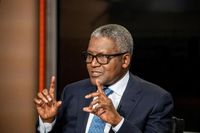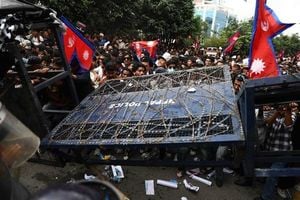On Monday, September 29, 2025, Nigeria’s oil and gas sector ground to a halt as the Petroleum and Natural Gas Senior Staff Association of Nigeria (PENGASSAN) enforced a nationwide strike, sending shockwaves through Africa’s largest economy. The action, which targeted key institutions including the Nigerian National Petroleum Company Limited (NNPC), the Nigerian Upstream Petroleum Regulatory Commission (NUPRC), and the Nigerian Midstream and Downstream Petroleum Regulatory Authority (NMDPRA), was a direct response to the mass dismissal of more than 800 Nigerian workers by the Dangote Petroleum Refinery.
From the early hours of Monday, staff arriving at their offices found themselves locked out, with security operatives confirming the full enforcement of the strike order. At the NUPRC headquarters in Abuja, gates remained firmly shut, leaving workers stranded outside, while the NMDPRA’s offices in the Central Business District saw a complete standstill. According to BusinessDay, Tony Iziogba, PENGASSAN Chairman at NMDPRA, reported, “It’s going on with 100 per cent compliance, we are complying with the strike.”
The union’s demands were clear and uncompromising: the strike would continue until every sacked Dangote Refinery worker was reinstated. “Until those members are called back to their work function, this strike will continue,” Iziogba emphasized, adding that the stoppage affected not just Dangote Refinery but every major oil and gas agency in Nigeria, including NNPC and NUPRC.
At the heart of the dispute lay allegations that Dangote Refinery’s management had fired the workers solely for joining PENGASSAN, a move the union described as a blatant violation of Nigeria’s labour laws, the Constitution, and International Labour Organisation (ILO) conventions. The Association insisted that “members are at will to join a union, and they did that in Dangote refinery, and two days after Dangote sacked every one of them, singularly because they became a member of the union.”
The Nigeria Labour Congress (NLC) quickly threw its weight behind the strike, instructing its affiliates and members nationwide to mobilise for what it called a “full-scale, decisive engagement” against what it described as Dangote’s “anti-worker practices.” In a circular signed by Comrade Joe Ajaero and reported by Daily Post, the NLC directed, “You are requested to commence, with immediate effect, preparation for a vigorous and comprehensive unionisation of all workers within every Dangote Group facility falling under your jurisdiction.”
The NLC’s statement pulled no punches, accusing the conglomerate of “union-busting, worker enslavement, and gross impunity.” The union described Dangote Refinery as “a state within a state,” where “facilities are not workplaces but plantations of exploitation, where the dignity of the worker is systematically crushed to maximise profit for the few.” The NLC further alleged repeated violations of Section 40 of the Nigerian Constitution and ILO Conventions 87 and 98, asserting that national labour laws had been treated with “utter disdain.”
As the strike bit deeper, PENGASSAN escalated its action, directing members to halt all gas and crude oil supplies to the Dangote Refinery. International Oil Companies, including TotalEnergies SE and Chevron Corp., were ordered to suspend deliveries, raising the stakes for the nation’s energy security. According to Investors King, the union’s move threatened to disrupt Nigeria’s daily crude exports—about 1.5 million barrels—and cripple the Dangote Refinery, which processes 650,000 barrels per day and meets between 35% and 50% of domestic gasoline demand.
The global fuel market did not remain indifferent. As reported by Investors King, gasoline futures surged the previous week, rising the most relative to crude since June, as traders braced for potential shortages. Analysts warned that any prolonged disruption could trigger fuel scarcity, soaring prices, and a nationwide energy crisis, given that the NNPC is Nigeria’s sole petrol importer and the Dangote Refinery has become a linchpin in reducing the country’s reliance on imported refined products.
In response to the escalating crisis, the Nigerian government scrambled to broker a resolution. Minister of Labour and Employment Muhammad Maigari Dingyadi described the strike as a “significant national concern” and convened an emergency meeting in Abuja, attended by top officials including the Minister of Finance, Wale Edun, the Minister of State for Labour and Employment, Dr. Nkeiruka Onyejeocha, and senior representatives of the Ministry of Petroleum Resources, NNPC, NMDPRA, and NUPRC. Dingyadi admitted, “We didn’t know the magnitude of this strike. Initially, we thought it was just about Dangote Refinery, but we have now been informed that it has extended to affect NNPC and other subsidiaries in the oil and gas industry.”
The government’s urgency was palpable. Dingyadi warned, “Consequentially, it will have adverse impacts, both on economic stability and national security.” He stressed that President Bola Tinubu was closely monitoring the situation and that the administration was determined to prevent the strike from becoming a national emergency. “We want to make sure that this face-off is not extended to the ordinary citizens of the country. That is why we are taking urgent steps to act as conciliators, to resolve this issue amicably for the good of our workers, our economy, and the spirit of our nation,” Dingyadi said, as quoted by The Nation.
Behind closed doors, the talks continued late into the evening, with both parties urged to approach negotiations with open minds. The stakes were high: PENGASSAN insisted that crude supplies would not resume until the dismissed staff were reinstated, while Dangote’s management described the union’s action as a threat to Nigeria’s energy security and economic recovery. In its defense, Dangote stated that the refinery was undergoing a “reorganization exercise” and that only a “very small number of staff” were discharged, denying any arbitrary or discriminatory intent.
Yet, PENGASSAN and its allies in the labour movement remained unconvinced, maintaining that the strike reflected a broader malaise of “exploitation” and “gross impunity” within the Dangote Group’s industrial relations. The union accused the refinery of not only firing Nigerian workers for union activities but also replacing them with expatriates, a move it described as both discriminatory and unacceptable. “All processes involving gas and crude supply to Dangote Refinery should be halted immediately,” PENGASSAN declared in a resolution signed by its General Secretary, Lumumba Okugbawa.
With the oil and gas sector at a standstill, ordinary Nigerians braced for the fallout. Experts warned of imminent fuel scarcity, rising pump prices, and disruptions to power plants dependent on gas supplies. As stakeholders awaited the outcome of the Abuja talks, hopes for a peaceful resolution rested on the willingness of all parties to uphold workers’ rights while safeguarding the nation’s fragile energy security.
As dawn broke on Tuesday, the country held its breath, watching for signs of compromise—or escalation. The events of September 29, 2025, underscored the delicate balance between labour rights and economic stability in a nation where oil remains both lifeblood and battleground.







